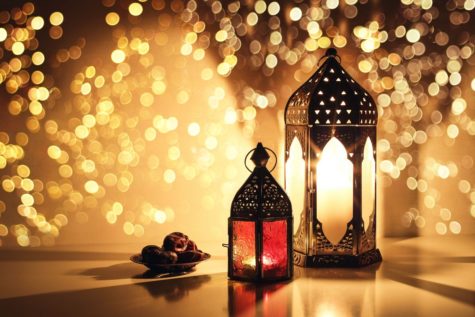Ramandan
January 8, 2023
Ramadan is the holy month of fasting for Muslims on the ninth month of the Islamic calendar. This coming year Ramadan begins on Wednesday, March 22, and ends on Friday, April 21. Muslims are required to abstain from food and drinks from dawn to dusk for 30 days. The reason Muslims fast is to remind themselves of the less fortunate and to be thankful for what they have. Fasting is one of the five pillars Muslims are required to follow as a healthy adult.
dawn to dusk for 30 days. The reason Muslims fast is to remind themselves of the less fortunate and to be thankful for what they have. Fasting is one of the five pillars Muslims are required to follow as a healthy adult.
Fasting consists of abstaining from food and drinks, from dawn to sunset. Muslims are recommended to eat before sunrise; this meal is known as suhur. Muslim break their daily fasts by having meals with their family and friends. This is called iftar. Some foods my family eats during Ramadan are Sambusa, dates, canjeero, and xalwo. Sambusa is a traditional Tajik pastry that is filled with meat. It has a triangular shape and the exterior is made with flour, eggs, salt, and water. The sambusa is filled with the meat mixture and then fried on the stove. Xalwo is a popular Somalian desert and is made from sugar, cornstarch, and oil.
Another one of the five pillars is known as Zakat, which is an obligatory act of charity. Muslims are required to donate a certain amount of their wealth to the needy each year. One of the best ways you can help the less fortunate during the month of Ramadan is by providing an iftar meal to the less fortunate. You can make a Ramadan meal donation to the local mosque. Ramadan also is a month of self reflection and self-improvement for Muslims. Some people will read the Holy Quran during this month to help grow a deeper connection with religion.
After the holy month of Ramadan we celebrate Eid-al fitr. This holiday is a significant celebration for Muslim families across the globe. After a month of fasting with devotion to Allah, the celebration allows Muslims to reward themselves. You must pray Fajr during dawn, before any celebration takes place. Before praying you must be in a state of cleanliness called Wudu: You must wash your hands, face, feet and arms with water. Many Muslims will visit the mosque in the morning of the Eid-al Fitr for prayer.
During Eid many people will give gifts to family and friends. Children are often given money from other Muslims that are in the mosque; they are given $5-20 dollar bills. Children are usually the ones who receive the most gifts. Some people might also receive clothes, jewelry, toys, books or electronic gadgets. Eid-al fitr is also an important day to dress up nicely. Women will wear a head covering called a hajib and also wear a long flowy abaya. Men can wear ankle length garments of wool or cotton known as thawb. It is a long white robe with full length sleeves.
To conclude, Ramadan is a very important month for many Muslims around the world. This month is focused on their faith and performing generous acts. Ramadan brings families together and allows them to be closer to Allah (God). Eid-al fitr is a celebration that begins when Ramandan ends. People will celebrate Eid-al fitr with friends and family to show gratitude toward God following the month of reflection.

